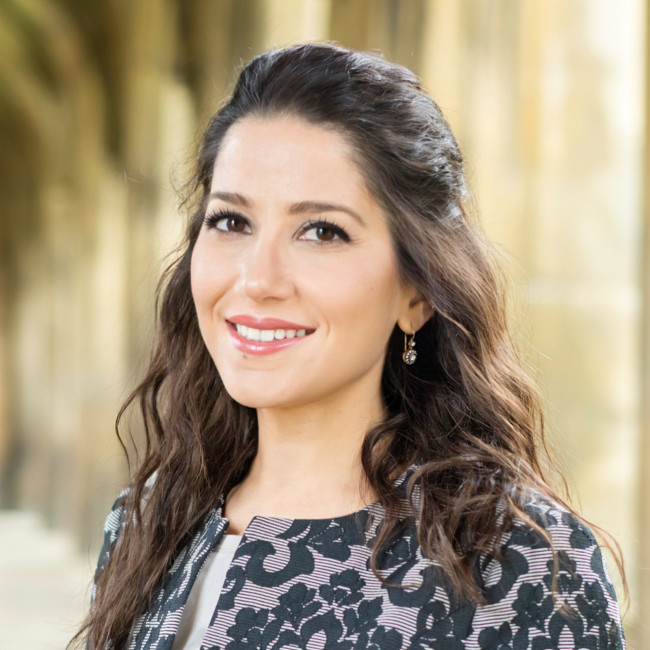Dr Banu Turnaoğlu Açan
Director of Studies in Politics
Subjects: Human, Social and Political Sciences

Degrees
- PhD in Politics and International Studies, Department of Politics and International Studies (POLIS), University of Cambridge
- MSc in Political Theory, Department of Politics and International Relations (DPIR), University of Oxford
- BA (Hons), Double Major in International Relations and History, Department of Political Science and International Relations, Koç University (Istanbul)
Profile
Dr Banu Turnaoğlu Açan is a historian of modern and international political thought, specialising in the late Ottoman Empire, the early Turkish Republic, and the global circulation of ideas on empire, constitutionalism, and republicanism. She is a Bye-Fellow and Director of Studies in Politics (HSPS) at Lucy Cavendish and a College Lecturer and Director of Studies in Politics at Magdalene College. She is also Assistant Professor in the History of Political Thought at Sabancı University (Istanbul).
Previously, she held a Leverhulme Early Career Fellowship at POLIS, University of Cambridge, where she earned her PhD and served as an Affiliated Lecturer. Her doctoral research on Turkish republicanism received the Political Studies Association’s Sir Ernest Barker Prize for Best Dissertation in Political Theory (2015). She was awarded a TÜBİTAK 2236 MSCA Co-fund Fellowship for the project The Eastern Question in the History of International Political Thought.
Research interests
Dr Turnaoğlu Açan’s research sits at the intersection of Ottoman, Middle Eastern, and European political thought and global intellectual history. She examines how republicanism, constitutionalism, imperialism, and responses to these currents, were articulated across Eastern and Western contexts in a comparative perspective, and how ideas of liberty, sovereignty, justice, order, and reform travelled between empires and nation-states from the eighteenth century onward. A central thread is crisis: how moments of disruption reshape notions of order and disorder and generate competing visions of future political life. By recovering extra-European contributions and placing them in close dialogue with European debates, she repositions Middle Eastern experiences as central to the making of the modern political world and to the entangled development of international order, law, and constitutional thought.
Her first monograph, The Formation of Turkish Republicanism (Princeton University Press, 2017), redefined the intellectual landscape of Ottoman and Turkish political thought by tracing the long arc of republican ideas and situating Turkish republicanism within international debates on constitutionalism and reform. The book challenged Eurocentric readings by showing how Ottoman thinkers developed and adapted these ideas through global intellectual networks.
Her current research advances three major projects. The Eastern Question: A New History (Princeton, under contract) reframes the Eastern Question as a crucible of global political thought, tracing how imperial decline and the rise of international law generated new ideas of order and justice across Eastern and Western debates. Positivism, Anti-Imperialism and Republicanism: The Political Thought of Ahmed Rıza (Cambridge, under contract) offers a reassessment of the Western imperial order and domestic political-social order through a leading Ottoman positivist in dialogue with French, British, and Ottoman debates. In parallel, she is co-editing Histories of Global Constitutionalism (Cambridge, under contract), an overarching survey spanning the Middle East, Iran, India, China, and Latin America. Her research has appeared in leading journals and edited volumes. She serves on the boards of the Intellectual History Review and Max Weber Studies and regularly convenes seminars and workshops on republicanism and global intellectual history.
Publications
Book
- The Formation of Turkish Republicanism. Princeton University Press, 2017.
Journal articles
- “Republicanism in Turkey: Visions, Dreams and Cultivation of a Political Reality,” Journal of Political Ideologies (2024). https://doi.org/10.1080/13569317.2024.2442320
- “Early Socialism and the Impact of the Paris Commune on the Ottoman Political Imagination in the Nineteenth Century,” Global Intellectual History (2023). https://doi.org/10.1080/23801883.2023.2258463
- “Osmanlı’da erken dönem sosyalizm ve radikal cumhuriyetçiliğin düşünsel kökenleri,” Tarih ve Toplum, no. 22 (2023): 55–90.
- (with E. Fuat Keyman) “Understanding the ‘New Turkey’ through Max Weber’s Category of Caesarism,” Max Weber Studies 22, no. 2 (2022): 60–93.
- “Despotism (İstibdad) in Ottoman Political Thought,” History of Political Thought 41, no. 1 (2020): 16–42.
- “Positivist Universalism and Republicanism of the Young Turks,” Modern Intellectual History 14, no. 3 (2017): 777–805.
- “A Battle of Ideologies in the Formative Years of the Turkish Republic,” Middle Eastern Studies 52, no. 4 (2016): 677–93.
- (with E. Fuat Keyman) “Neo-Roma ve Neo-Atina Cumhuriyetçiliği: Türkiye, Cumhuriyetçilik ve Demokratikleşme,” Doğu-Batı 47 (2009): 37–65.
Book chapters
- “Particularism vs. Universalism: Ottomanism and Constitutionalism during the Second Constitutional Period,” in Hans Lukas Kieser and Khatchig Mouradian (eds.), The I.B. Tauris Handbook of the Late Ottoman Empire: History and Legacy (I.B. Tauris, 2025).
- “The Origins of Turkish Radical Republicanism,” in Bruno Leipold, Karma Nabulsi, and Stuart White (eds.), Radical Republicanism: Recovering the Tradition’s Popular Heritage (Oxford University Press, 2020).
- “The New Ottoman Conception of War, State and Society in the Prelude to the First World War,” in Dimitris Stamatopoulos (ed.), European Revolutions and the Ottoman Balkans: Nationalism, Violence and Empire in the Long Nineteenth Century (I.B. Tauris, 2020).



